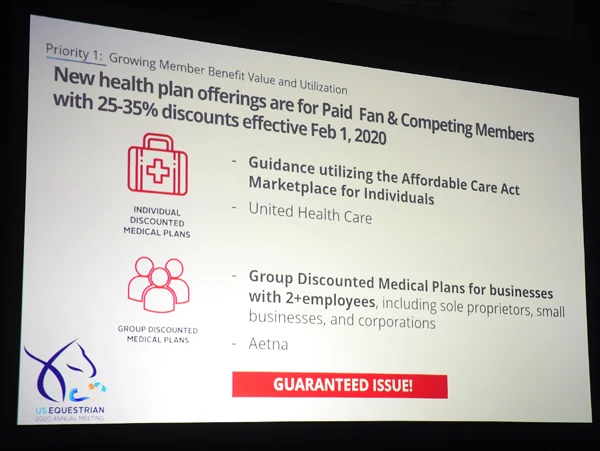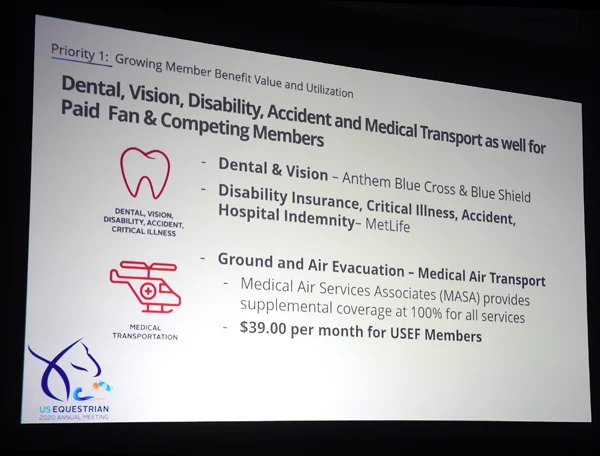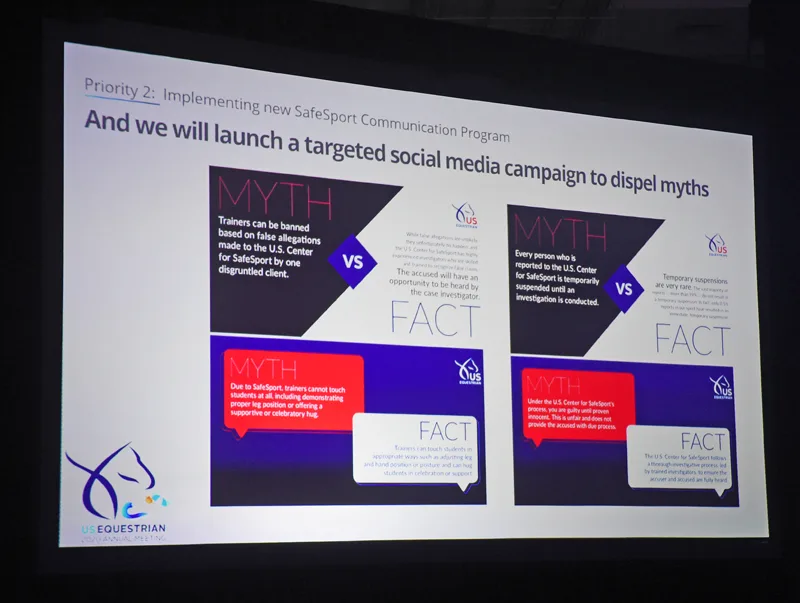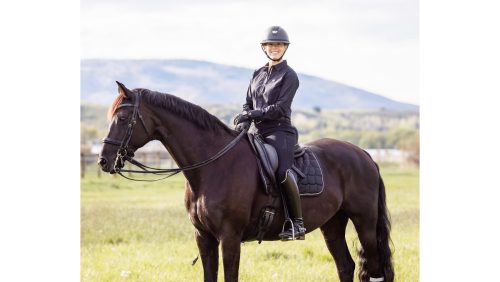The 2020 U.S. Equestrian Federation Annual Meeting may go down in history not for what happened there, but for what did not. For the first time, rule changes didn’t take center stage at the meeting held Jan. 8-11 in West Palm Beach, Florida. Approving new rules for the 2021 competition season will happen at the board of directors’ mid-year meeting in Lexington, Kentucky, instead, while discussions at the annual meeting took a more strategic view, focusing on the federation’s past, present and future.
This switch was six years in the making, as USEF staff brainstormed a better way to present rule changes to the BOD rather than cramming in review and language tweaks between the major affiliate meetings (U.S. Dressage Federation, U.S. Hunter Jumper Association and U.S. Eventing Association) in December and the January USEF meeting. The goal is to reduce the number of rule changes over time.
“We were seeing so many changes that were the result of poorly written rules or not deliberate and well thought through,” said USEF General Counsel Sonja Keating. “Lots of clarifications. It used to be 18 months before [new rules] went into effect. Then before it even went into effect, we had people wanting to make changes to a change. This provides—hopefully, we’re going to just test it and see—the opportunity to really put the time in, and we’re hoping over time we’ll see it eliminating clarifications and changes to changes.”
The new format is an experiment and was done via a presidential modification, so if it doesn’t work no additional rule changes will be required to return to the old system. Rules change proposals are available on the USEF’s website, and members are welcome to comment online or to attend the mid-year meeting.
So what did happen at the 2020 USEF Annual Meeting? Here are the top seven things you need to know.
ADVERTISEMENT
1. USEF will offer insurance and health benefits to members starting Feb. 1, 2020. For individuals, that means help navigating the Affordable Care Act marketplace. Small business owners can sign up for discounted health insurance for themselves and their employees. USEF will also offer discounts on vision, dental, disability, accident and pet insurance as well as coverage for medical ground and air transportation. Members can call a hotline—1-800-349-1082—for help navigating all insurance matters. USEF members can also access mental health emergency support with free counseling sessions provided by MY Group. The number to call is 1-800-633-3353.

 2. The USEF is no longer in the drug testing business. All samples collected go directly to the University of Kentucky’s Equine Analytical Chemistry Laboratory, which is run by Scott Stanley, DVM, Ph.D. “The collection of the samples has always been the fundamental basis of the USEF program,” said Stephen Schumacher, DVM and chief administrator of the USEF Drugs and Medication Program. “It allows us to focus on what we do with collection samples and the adjudication process.”
2. The USEF is no longer in the drug testing business. All samples collected go directly to the University of Kentucky’s Equine Analytical Chemistry Laboratory, which is run by Scott Stanley, DVM, Ph.D. “The collection of the samples has always been the fundamental basis of the USEF program,” said Stephen Schumacher, DVM and chief administrator of the USEF Drugs and Medication Program. “It allows us to focus on what we do with collection samples and the adjudication process.”
Other benefits of an independent lab include significantly upgrading test equipment at a reduced price, thanks to UK’s academic discount, and a feature coming soon that will allow USEF members to send pre-purchase examination bloodwork to the new lab for analysis.
3. SafeSport and the Minor Athlete Abuse Prevention Policy are not going away, but the USEF is going to do a better job explaining them. They’ve hired Sarah Hamilton from the PR firm Kivvit to put together an education campaign that will include a redesigned section of the USEF website with information specific to trainers, riders, parents, competition management, officials and affiliates, as well as FAQs and myths. USEF will conduct town hall meetings across the country to address member questions. The USEF received a perfect score on SafeSport compliance in a U.S. Center for SafeSport audit.

The USEF website will soon have a lot more information available regarding SafeSport. Sara Lieser Photos
“We should be the ambassadors of our community, the ambassadors of our sport,” said USEF President Bill Moroney. “We should be telling people: We have training; we have resources; we have education; we have reporting systems; we are proud to have that. Parents, bring your children to our sport. Husbands and wives and significant others, come and feel safe in our sport. We need to be promoting what we’re doing to make our environment safe rather than buying into any process of tearing it down.”
ADVERTISEMENT
4. The relationship between the USEF and its affiliates is still a work in progress. While USEF has formal agreements in place with 15 out of 19 affiliates, the sports of driving and endurance don’t currently have USEF affiliates, as the American Driving Society and the American Endurance Ride Conference left the federation. The USEF Driving and Endurance committees are currently acting as the affiliates, and they’re working to make sure drivers and endurance riders can get the qualifications they need for international competition. USEF hired Terri Dolan, who came from the American Saddlebred Horse Association, as the director of national breeds and non-FEI disciplines, and she’s helped implement an affiliate workshop system to improve communication between USEF and the affiliates.
“As the affiliate agreements morph, for some of us it’s very important to have what the federation is responsible for, what the affiliate is responsible for, and where are the shared areas,” said Mary Babick, USHJA president and chairman of the National Breeds and Disciplines Council. “Good fences make good neighbors.”
5. The Olympic Games in Tokyo are going to be expensive. Really expensive. USEF Director of Sport Will Connell said repeatedly throughout the meeting: “Tokyo is going to be one of the most expensive Games if not the most expensive Games in history.”
While transport and housing will be astronomical, and the heat and humidity will pose challenges, Connell assured that the facilities, while tight, are horse friendly with air conditioned stabling and plenty of training areas.
6. The USEF governance structure continues to evolve. The Admin Council has been replaced by the Member Services Council, which is led by Shelley Campf and is an interactive group working on driving development of new business for the federation, overseeing its functions, and challenging leadership to think outside the box. The Safety Committee was dissolved and replaced by the Human and Equine Welfare Committee, which has the mandate to consider all different aspects of horse and human welfare.
7. National coaching certification is on the horizon. Connell has said repeatedly that if USEF doesn’t implement some kind of national coaching competency certification, then it will be imposed from the outside. The International Disciplines Council agreed to work on a basic structure for a coaching program that would work across sports and with the existing affiliate programs and present it to the board of directors.














